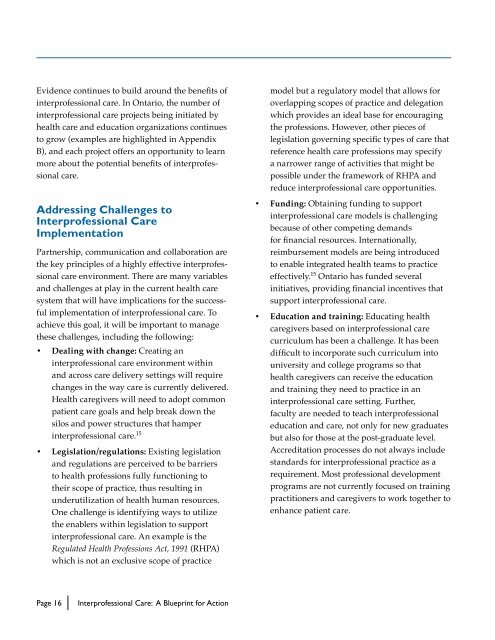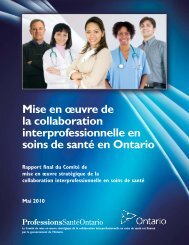Interprofessional Care: A Blueprint for Action - HealthForceOntario
Interprofessional Care: A Blueprint for Action - HealthForceOntario
Interprofessional Care: A Blueprint for Action - HealthForceOntario
You also want an ePaper? Increase the reach of your titles
YUMPU automatically turns print PDFs into web optimized ePapers that Google loves.
Evidence continues to build around the benefits of<br />
interprofessional care. In Ontario, the number of<br />
interprofessional care projects being initiated by<br />
health care and education organizations continues<br />
to grow (examples are highlighted in Appendix<br />
B), and each project offers an opportunity to learn<br />
more about the potential benefits of interprofessional<br />
care.<br />
Addressing Challenges to<br />
<strong>Interprofessional</strong> <strong>Care</strong><br />
Implementation<br />
Partnership, communication and collaboration are<br />
the key principles of a highly effective interprofessional<br />
care environment. There are many variables<br />
and challenges at play in the current health care<br />
system that will have implications <strong>for</strong> the successful<br />
implementation of interprofessional care. To<br />
achieve this goal, it will be important to manage<br />
these challenges, including the following:<br />
• Dealing with change: Creating an<br />
interprofessional care environment within<br />
and across care delivery settings will require<br />
changes in the way care is currently delivered.<br />
Health caregivers will need to adopt common<br />
patient care goals and help break down the<br />
silos and power structures that hamper<br />
interprofessional care. 15<br />
• Legislation/regulations: Existing legislation<br />
and regulations are perceived to be barriers<br />
to health professions fully functioning to<br />
their scope of practice, thus resulting in<br />
underutilization of health human resources.<br />
One challenge is identifying ways to utilize<br />
the enablers within legislation to support<br />
interprofessional care. An example is the<br />
Regulated Health Professions Act, 1991 (RHPA)<br />
which is not an exclusive scope of practice<br />
Page 16 <strong>Interprofessional</strong> <strong>Care</strong>: A <strong>Blueprint</strong> <strong>for</strong> <strong>Action</strong><br />
model but a regulatory model that allows <strong>for</strong><br />
overlapping scopes of practice and delegation<br />
which provides an ideal base <strong>for</strong> encouraging<br />
the professions. However, other pieces of<br />
legislation governing specific types of care that<br />
reference health care professions may specify<br />
a narrower range of activities that might be<br />
possible under the framework of RHPA and<br />
reduce interprofessional care opportunities.<br />
• Funding: Obtaining funding to support<br />
interprofessional care models is challenging<br />
because of other competing demands<br />
<strong>for</strong> financial resources. Internationally,<br />
reimbursement models are being introduced<br />
to enable integrated health teams to practice<br />
effectively. 15 Ontario has funded several<br />
initiatives, providing financial incentives that<br />
support interprofessional care.<br />
Education and training:<br />
• Educating health<br />
caregivers based on interprofessional care<br />
curriculum has been a challenge. It has been<br />
difficult to incorporate such curriculum into<br />
university and college programs so that<br />
health caregivers can receive the education<br />
and training they need to practice in an<br />
interprofessional care setting. Further,<br />
faculty are needed to teach interprofessional<br />
education and care, not only <strong>for</strong> new graduates<br />
but also <strong>for</strong> those at the post-graduate level.<br />
Accreditation processes do not always include<br />
standards <strong>for</strong> interprofessional practice as a<br />
requirement. Most professional development<br />
programs are not currently focused on training<br />
practitioners and caregivers to work together to<br />
enhance patient care.





